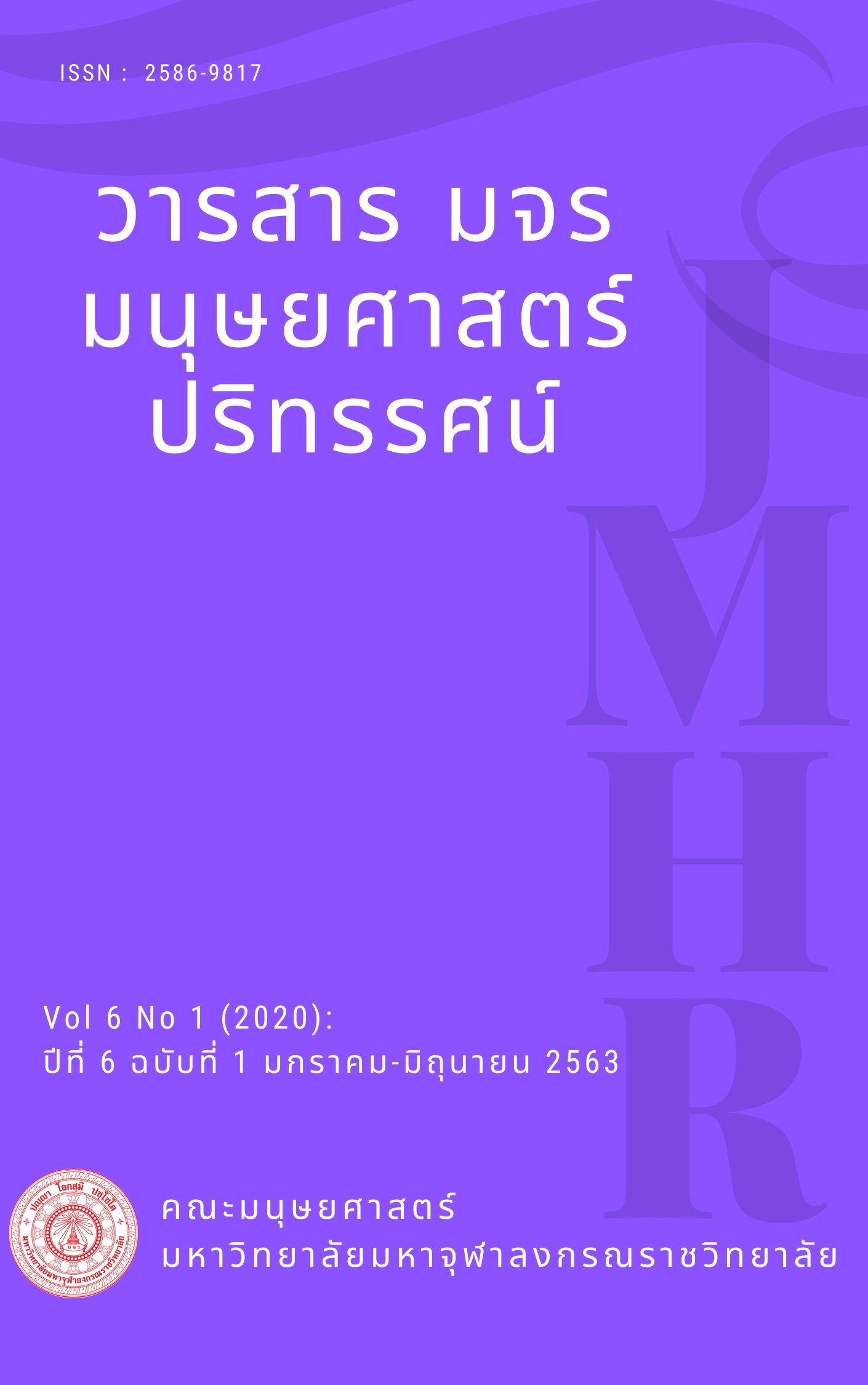การพัฒนาโมเดลความสุขของคนในชุมชนเขตพื้นที่อำเภอบ้านตากจังหวัดตาก
คำสำคัญ:
การพัฒนา, ความสุข, ชุมชน, หนี้ครัวเรือน, ครอบครัวบทคัดย่อ
การวิจัยครั้งนี้มีจุดประสงค์เพื่อศึกษาหาสิ่งที่เป็นความสุขของคนในชุมชนในเขตพื้นที่อำเภอบ้านตาก จังหวัดตาก และปัจจัยที่มีผลกระทบต่อความสุขของคนในชุมชนเขตพื้นที่อำเภอบ้านตาก จังหวัดตาก รูปแบบของการวิจัย เป็นการวิจัยแบบเชิงคุณภาพและเข้าร่วมสังเกตการณ์กับคนในเขตพื้นที่ โดยประชากรเป็นชุมชนที่อยู่ในเขตอำเภอบ้านตาก ซึ่งประกอบไปด้วย 7 ตำบล 68 หมู่บ้าน และกลุ่มตัวอย่างเป็นผู้นำหมู่บ้านหรือผู้นำชุมชนทั้งที่เป็นทางการและไม่เป็นทางการได้แก่ กำนัน ผู้ใหญ่บ้าน หัวหน้าหมู่บ้าน เป็นต้น จำนวน 136 คน เก็บรวบรวมข้อมูลโดยใช้แบบสอบถามแบบกึ่งโครงสร้าง
ผลการวิจัยพบว่า ความสุขของคนในเขตพื้นที่อำเภอบ้านตาก จังหวัดตาก สามารถระบุออกได้เป็น 4 ประเภทหลัก ๆ โดยเรียงลำดับจากมากสุดไปหาน้อยดังต่อไปนี้ คือ 1. ครอบครัวไม่มีหนี้สินทำให้มีความสุขมากที่สุด (ร้อยละ 28.67) 2. ครอบครัวอยู่รวมกันอย่างพร้อมหน้า (ร้อยละ 26.47) 3. คนในสังคมพึ่งพาอาศัยกันได้ (ร้อยละ 22.79) และ 4. คนในชมชุนได้รับการคุ้มครองจากเจ้าหน้าที่ของภาครัฐ (ร้อยละ 22.05) และปัจจัยที่มีผลกระทบต่อความสุขของคนในชุมชนเขตพื้นที่อำเภอบ้านตาก จังหวัดตาก สามารถระบุออกได้เป็น 6 ประเภท โดยเรียงลำดับจากมากไปหาน้อยดังต่อไปนี้ 1. แต่ละครอบครัวมีที่ดินเพื่อทำการเกษตรอย่างเพียงพอ เป็นปัจจัยที่จะทำให้มีความสุขมากที่สุด (ร้อยละ 24.26) 2. คนในชุมชนมีสุขภาพที่ดี (ร้อยละ 20.58) 3. บุตรหลานได้รับศึกษาในระดับที่เพียงพอ (ร้อยละ 18.38) 4. สังคมมีระบบสาธารณูปโภคที่เพียบพร้อมต่อการดำเนินชีวิต (ร้อยละ 13.97) 5. มีการอนุรักษ์ศิลปะวัฒนธรรมแบบพื้นบ้านและมีการสานต่อให้คงอยู่อย่างยั่งยืน (ร้อยละ 12.5) และ 6. คนในชุมชนได้เข้าวัดฟังธรรมเพื่อทำบุญสร้างกุศล (ร้อยละ 10.29)
เอกสารอ้างอิง
กรมพัฒนาชุมชน. (2557). การประเมินความ“อยู่เย็น เป็นสุข” หรือความสุขมวลรวมของหมู่บ้าน/ชุมชน. สืบค้น 10 เมษายน 2556, จากwww3.cdd.go.th/phanomphrai/GVH.pdf
วิรัช วิรัชนิภาวรรณ. (2550). การบริหารจัดการตามแนวทางคุณธรรมและแนวทางเศษฐกิจพอเพียง. กรุงเทพฯ: สำนักพิมพ์โพเพรช.
สมบัติ ธำรงธัญวงค์. (2544). นโยบายสาธารณะ แนวคิด การวิเคราะห์และกระบวนการ. กรุงเทพฯ: สถาบันบัณฑิตพัฒนบริหารศาสตร์.
ไชยรัตน์ เจริญสินโอฬาร. (2544). รัฐศาสตร์แนววิพากษ์ (พิมพ์ครั้งที่2) กรุงเทพฯ: สำนักพิมพ์มหาวิทยาลัยธรรมศาสตร์.
เอนก เหล่าธรรมทัศน์. (2558). เมือง ย้อนคิด มุ่งสู่อนาคต ศูนย์การศึกษามหานครและเมือง. วิทยาลัยรัฐกิจ มหาวิทยาลัยรังสิต: บริษัท มาตา จำกัด.
กรมการปกครอง. (2561). ข้อมูลการปกครองส่วนภูมิภาคประเทศไทย ปี พ.ศ.2559. สืบค้น 20 มีนาคม 2561, จาก http://www.zcooby.com/2559-thailand-informationnumber-statistics
วรเดช จันทรศร. (2556). ทฤษฎีการนำนโยบายสาธารณะไปปฏิบัติ (พิมพ์ครั้งที่ 6). กรุงเทพฯ: พริกหวาน.
บุศรา โพธิสุข. (2559). การมีส่วนร่วมทางการเมืองท้องถิ่นของประชาชน : ศึกษาเฉพาะกรณีตำบลช้างเผือก อำเภอเมือง จังหวัดเชียงใหม่. วารสารพิฆเนศวร์สาร, 12(1), 151-164.
บุญทัน ดอกไธสง. (2562). กลไกการขับเคลื่อนศักยภาพขีดความสามารถของผู้สูงอายุโดยบูรณาการหลักพุทธธรรม. วารสารสหวิทยาการวิจัย ฉบับบัณฑิตศึกษา, 8(1), 26-32.
สาโรจน์ โอพิทักษ์ชีวิน. (2554). การจัดการและพฤติกรรมองค์กร: เพื่อสร้างและรักษาความได้เปรียบเชิงแข่งขันไว้ให้ยั่งยืนในโกลบอลไลเซชั่น. กรุงเทพฯ: ซีวีแอลการพิมพ์.
Henry, Nicholas. (1995). Public administration and Public Affairs (6th ed). Englewood Cliffs, New jersey: Prectice-Hall.Inc.
Navarat Boonpila. (2017). Taking the Philosophy of Sufficiency Economy Applied to Develop the Community Economy for the Case of Ban Tonnalab, Moo 1, Tonnalab Sub-district, Ban Dung, Udon Thani Province. Mahachula Academic Journal, 4(2), 67-75.
Schien, E. H. (1992). Organizational culture and leadership (2nd ed). San Francisco: Jossey Bass.

ดาวน์โหลด
เผยแพร่แล้ว
รูปแบบการอ้างอิง
ฉบับ
ประเภทบทความ
สัญญาอนุญาต
ลิขสิทธิ์ (c) 2020 วารสาร มจร มนุษยศาสตร์ปริทรรศน์

อนุญาตภายใต้เงื่อนไข Creative Commons Attribution-NonCommercial-NoDerivatives 4.0 International License.





